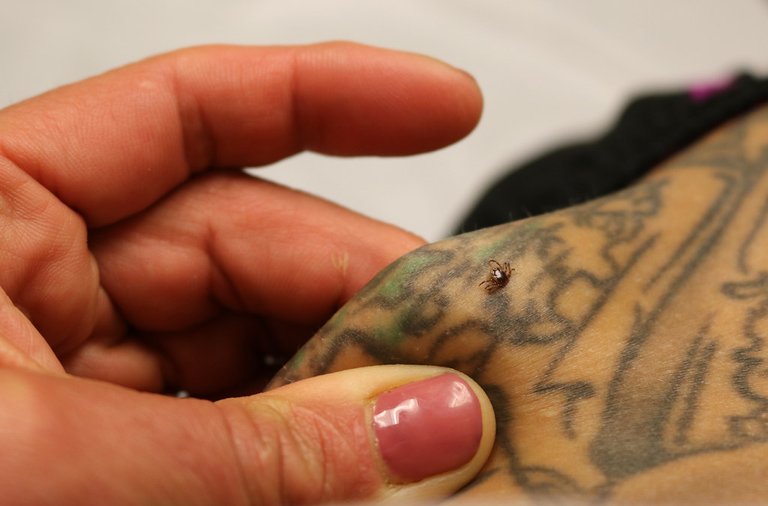We love pets a lot and we can do anything for our pets but also we know that our pets can do a lot for us even when they cannot talk like we do. They can do so many amazing things as well as put us through some serious rigor of cleaning their feces and urine even when we shout STOP THAT at the top of our voices. Asides from that, we also have to deal with lice and ticks on them and this crawling insects can find their way into our personal spaces including cloths, bed, and hair. There can also be cases when we bring this crawling insects into our space by ourselves from external visit.
This is the case of a 47-year-old man who came to the emergency room in January of 2021 feeling faint (Presyncope), he had rashes that were itchy (Diffuse pruritic rash) and swollen eyelid. It isn't like he just started feeling unwell that day, he had been having series of health symptoms like watery bowel movement after eating (postprandial) for about three weeks before coming to the hospital but the bowel movement wasn't accompanied with blood. He also began to experience serious abdominal crampy pain, nausea, and vomiting occasionally, and this brought him to the hospital because it looked like the entire symptoms of all diseases were beginning to show up on his body one after another.

Upon arrival at the Emergency department (ED), doctors began to work on him trying to find out what could be the cause of his multiple symptoms. The patient could be feeling faint as a result of intravascular volume depletion from Gastrointestinal Problem but this is not the only symptom that he was experiencing. Postprandial watery bowel movement could be as a result of a GI Tract infection or maybe malabsorption which might arise from conditions like Celiac Disease.
But seeing that the symptoms were many but localized, it could mean that Mast cells were activated either by allergies or anaphylactic reactions. Mediators like histamine can lead to multi-organ symptoms but what could trigger this mast cells to be activated and cause this much issues. Allergies can be gotten from foods, medications, and our environment but then multi-organ symptoms can also be triggered by underlying conditions like mastocytosis or mast cell activation syndrome.
But doctors will also not rule out the fact that it could be hereditary or drug induced angioedema. If doctors will have to rule out hereditary, then they need to know his history and so it was confirmed that the patient had type2 diabetes, High triglyceride level, rapid heartbeat, a history of kidney stone and ADHD. As expected, he was taking medications to treat these conditions with drug like Metformin, Saxagliptin, metoprolol, atorvastatin, amphetamine, but then started taking Napeoxen and antacid for his abdominal pains.

When he was asked about travel history, he hadn't traveled out of Michigan where he lived at least in recent times and since he wasn't one who liked t try out new dishes, he hadn't eaten any new food or stayed around people who were sick or immunocompromised. While doctors noticed that his temp, oxygen rate, and saturation were normal, his heart rate was fast, and his blood pressure was low. Doctors noticed he had swollen lips and tender soft abdomen with no swollen lymph node, enlarged spleen or liver but he had hives on his neck, scalp, groin, abdomen, and shoulders.
His symptoms may point to Anaphylaxis or as a result of infectious cause. In the case of Anaphylaxis, it can be caused by insect bites, stings, food, or medications. Upon blood work, it was seen that his white blood cell count was very elevated up to 26500 mm3 compared to the normal 4500 to 11000mm3 which just confirms that previous suspicion, high lactic acid, his iron levels were normal so he was not anemic, Serum sodium levels were low, elevated serum troponin level suggested inadequate blood flow to the heart, and he had a reduced kidney function. The patient was tachycardic and trust me, this is a lot for one person, so what could be the cause?
Soon the patient began to show signs of possible shock which just showed that it could be histamine levels causing the problem and epinephrine should be considered to prevent anaphylaxis. Four days later his condition worsened as he had tightening of the chest, worsening rash, tachycardia, hypotension, wheezing, and reduced oxygen saturation. When Blood work came back, it showed that he had elevated tryptase level, and elevated Serum IgE level which indicated that he was suffering from an allergy. Let me state that his condition became better after he was administered epinephrine and treated on the first day he came to the hospital, so it forced doctors to ask what could have triggered the attack on the forth day.

Doctors requested to know what he ate at the hospital on the forth day and he mentioned that he had eaten beef 4 hours before his symptoms worsen. I could imagine the medical practitioner having the light bulb moment like I got the cause. So he was asked about his hobbies and job, and he mentioned that he was a deer hunter who hunted white-tailed deer and he had eaten venison 2 days before he came to the emergency department.
Alpha-Gal Allergy was the next suspect on the board. Galactose -alpha-1,3-galactose (Alpha-Gal) is a carbohydrate that is not present in humans but present in all non-primate mammals. So exposure to the carbohydrate can cause the body to see it as foreign thereby causing the immune system IgE antibodies to react directly which would lead to an allergic response when they eat red meat.
Remember I mentioned tick at the beginning of this post, yes the Lone-star Tick (Ambluomma Americanum) is a vector for this exposure in humans and the carbohydrate found in the saliva contains the ticks. One of the animals these tick feed on is the white-tailed deer. This patients might have been bitten by the tick while hunting or brought it into his home without knowing and so got the carbohydrate in his body. He was diagnosed with Alpha-Gal syndrome and was discharged after given glucocorticoids, and antihistamines and he was given a patting warning which is to stay away from red meat. Months later when he was tested again, he still had the Alpha-Gal IgE in his blood but his tryptase level was normal this time around.
Post Reference
https://pmc.ncbi.nlm.nih.gov/articles/PMC9306225/
https://pmc.ncbi.nlm.nih.gov/articles/PMC3085643/
https://pmc.ncbi.nlm.nih.gov/articles/PMC8344025/
https://www.cdc.gov/alpha-gal-syndrome/about/index.html
https://www.nhs.uk/conditions/anaphylaxis/
Image Reference
Image 1 || Flickr || Lone Star Tick Bite
Image 2 || Flickr || ER not comfortable, patch of nitroglycerin on my chest
Image 3 || Flickr || DSC_1491
Thanks for your contribution to the STEMsocial community. Feel free to join us on discord to get to know the rest of us!
Please consider delegating to the @stemsocial account (85% of the curation rewards are returned).
Thanks for including @stemsocial as a beneficiary, which gives you stronger support.